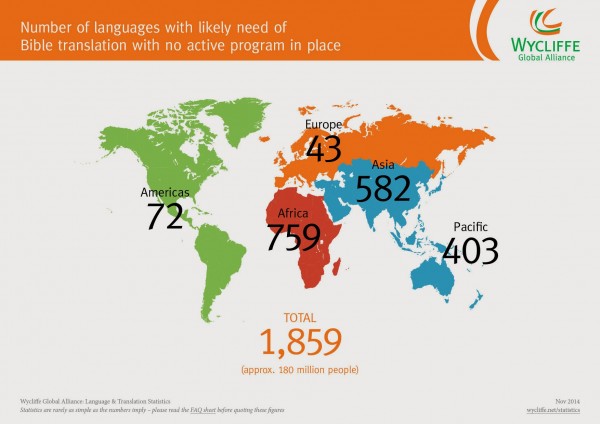 This page is by no means exhaustive, but we hope it might answer some of your questions. Email us if you have other questions or if something is not clear! Consider this page a work in progress, and if you have suggestions for new questions, don’t hesitate to let us know.
This page is by no means exhaustive, but we hope it might answer some of your questions. Email us if you have other questions or if something is not clear! Consider this page a work in progress, and if you have suggestions for new questions, don’t hesitate to let us know.
What’s an unreached people group? In roughly 2000 of the world’s 6,500 people groups, there is no church, nor is there any work being done to establish a church. Often they are without the Word of God in their own language. Sometimes there might be a church building that someone set up, but the gospel was never actually clearly taught. So, “unreached” refers to whether or not they’ve been reached with the gospel and usually involves whether or not they have a Bible translation in their own language. NTM and Wycliffe uses close to the same parameters to determine who is “unreached.
What part does New Tribes Mission play? NTM helps local churches train, coordinate, and send missionaries to these unreached people groups. They come along side the local church as it seeks to accomplish the Great Commission. They offer specialized training in cross-cultural ministry that most churches might find difficult when trying to equip their missionaries. Once missionaries are equipped and on the field, NTM provides further resources for the church and the missionaries to see the work finished. So the “sending” responsibility remains with the churches, while NTM brings organization and greatly assists the work.
Why such a long time? We take for granted the components we have in place to being able to share the gospel and disciple someone here in the United States. Think about it; we speak the same language, we can usually tell where they are coming from as a person by some conversation beforehand, and we have the written Bible in their heart language. These are basic, yet essential components that aren’t in place when ministering among an unreached people group. To learn a people group’s heart language to the point of being able to teach in it, plus the effort to translate the Bible into that language, takes time. And did I mention that these unreached people group’s languages are usually unwritten? Learning a language is hard enough in itself, but what about when there is no Rosetta Stone or any sort of helps available to learn them?! These unwritten languages then need to be put in a written format in order for a translation work to begin. Think of all these things as an “infrastructure” that needs to be in place before much of the building can begin.
As one of our instructors at the training center said, “The gospel is the single most important message that can be communicated, why would we not take the time to make sure we communicate it with the utmost care?”
Here’s some more about the “big picture” if you care to find out more.
Can’t you just teach in the trade language? Imagine that you had just moved to Mexico with only two years of high school Spanish and someone wanted to share an important message with you, or even handed you a Spanish Bible. It would not quite be as meaningful or clear as if it were in English. Plus, the first language we learn and the one we use with our family everyday is always the most meaningful, which is why sometimes it’s referred to as the “heart” language.
What all goes into a Bible translation? We’re not experts on this yet, but we hope to be involved in this in some way later in the future. Bible translation is a huge job that will take many years. The first hurdle is becoming fluent in the language of the people we’ll work among, which may take several years. Then we will begin to work through the passages that we’ll need to teach to go from Creation to Christ, and so on and so forth. But, the actual process of translation is extremely complex. It’s a lot more than finding one word in our Bible for one word in their language. You’ve got heaps of grammar to deal with and beyond that, the way that people speak when they tell a story or the way they teach is entirely different than what is normal to us. It will take lots of effort from all sorts of people on the team, plus we’ll need the assistance of faithful language helpers and consultants to guide us in the process.
What does Asia Pacific (AP) actually mean? It’s a region in the South Pacific, right above Australia. We keep things discreet for safety reasons. Email us if you want to know more.
What kind of dangers are there? NTM has been doing missions work for a long time now and has refined how to interact with the multitude of possible dangers overseas. We have people who make it their job to stay on top of current or developing issues and keep us informed. There are reasonable risks we will take in the future that, if you think about it, aren’t too different than what we are faced with in the United States. Ever think about what all could go wrong while behind the steering wheel of a car? We consider the risk, weigh it against the likelihood of what could go wrong, and make a decision from there. We take reasonable risks with vehicles every day, and that’s for the sake of work and errands and such. How much more so is it worth taking risk when dealing with the Gospel and people’s eternity?
So, yes, there are bugs and volcanoes and illnesses like malaria, which we will wisely take heed of, but we can’t allow them to deter us from moving forward with full confidence in our God. The command from God for the church to, “Go,” was given with all the dangers fully known by Him–He didn’t forget to take those into consideration!
How do I know if I am called to be a missionary? We believe that God called all believers to have some part in “making disciples of all nations” (Matt.28:19). But you need to consider how He wants you to be involved personally, whether it means getting directly involved, praying intentionally for missionaries, supporting their work, or being a part of sending them out from your local church. Spend time with God and His Word, listening. Talk to your pastors and other godly people in your life. Here are a few things to consider:
- Pray! Ask the tough questions and wait for God to answer with a ready heart.
- Seek wise and godly counsel. If you’re considering becoming a missionary, the input and encouragement of your church leaders is essential.
- Get in touch with a missionary for first-hand insight.
Also, feel free to check out our story and see how God led us into church planting. Or email us if you have more questions!
Are you going to be in there by yourself? When we first arrived in the country, we had quite a few people that are arriving at the same time to start language learning, plus each field has leaders to help us out and guide us through the process of getting acquainted with Asia Pacific. When we’re living among an unreached people group further interior, we’ll have teammates. Everything NTM does is usually in teams because there’s always strength and accountability in numbers.
Aren’t you going to ruin their culture? This is a common question. Often people feel that by missionaries living among the people, things will radically change and disrupt the culture in such a way that it collapses. When NTM works in a people group to plant a church, the goal is indigenization, which means that it should take on a flavor of the culture and become their own. This is also maintained by the fact that NTM always works in the mother tongue of the people. Also, putting their language into written form and teaching them to read and write is a way to promote the preservation of the language, which is a part of preserving culture. We’re not there to make them into little Westerners! That’s not sustainable, which is contrary to the target of a mature church.
Plus, as urbanization plows into these people groups, fewer and fewer of them are isolated from the outside world. Many of them are looking to head to cities and towns in search of work. Sometimes the city comes to them as loggers and miners and even drug cartel are looking to make money, which usually means exploitation is somewhere in the mix. All of this usually means that their culture is taking a hit whether or not they invite it in.
And the most prominent arguments is that they are happy the way they are. From the testimonies of many different tribal groups, they were not happy the way they were, living in fear and under taboos. They live with many diseases and are usually illiterate. There babies die because of curable diseases or because of spiritual taboos. There are often revenge killings because nothing is an accident the mind of an animist.
Do you care for any of their physical needs as well as their spiritual needs? Often medical work is In the mix, but it usually just depends on the government and sometimes the specific needs of the people group. If we do anything involving community projects or medical, the goal is to make it sustainable among their people group and it also needs to not hinder brining the good news in a timely manner. Every people group will learn how to read and write their own language through a literacy program that the team starts and later turns over to the people group.
How often will you come home? A typical term is four years on the field and one year on home assignment.
Are you going to a place where they’ve never seen white people before? Probably not. There are only a few places left on the planet where that’s the case. The reach of technology and other advances has made this rare. But, regardless, we’ll probably be in an area where there aren’t too many outsiders.
Why do you have to learn the national language? Regardless of where we end up in Asia Pacific, we’ll still have to function in the hosting country. This means we’ll need to be able to ride the bus, talk to government officials, buy supplies, etc. But beyond that, we’ll need to be able to talk with people! Our time in the city should also involve the national church since we’re all a part of the work together, plus we might even have co-workers that are from Asia Pacific. NTM values working with the local church and it will be the same overseas as it was in the States.
Why can’t you go to the tribe right away? It takes quite a bit of resources and effort to sustain living in a rural location overseas. It would be near impossible if we didn’t know the national language. We need to be familiar with our larger surroundings, form a team, and consider where we might serve once we get a feel for the options, which are quite vast in Asia Pacific.
Leave a Reply